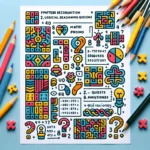Understanding IQ Tests: A Deep Dive into the Question Types
Have you ever wondered what types of questions you might encounter on an IQ test? Intelligence Quotient, or IQ tests, are designed to assess cognitive abilities and potential. These standardized assessments have a variety of question types, each crafted to measure different aspects of intelligence. Let’s explore the key types of questions typically featured on an IQ test, helping you grasp what to expect and how these questions probe different dimensions of your intellect.
**1. Logical Reasoning Questions:**
One of the core components of IQ tests is logical reasoning questions. These questions assess your ability to identify patterns, logical connections, and sequences. For example, you might be presented with a series of shapes or numbers and asked to predict the next in the series. Logical reasoning questions are crucial, as they measure deductive and inductive reasoning skills, which are fundamental to problem-solving and critical thinking.
**2. Verbal Comprehension Questions:**
Another common type of question on IQ tests are verbal comprehension questions. These assess your understanding of language, vocabulary, and your ability to process and assimilate written information. Typically, these questions come in the form of reading passages followed by comprehension questions, analogies, or antonyms and synonyms. Excelling at these questions indicates strong verbal reasoning skills and a robust grasp of language.
**3. Spatial Visualization Questions:**
Spatial visualization questions require test-takers to manipulate or visualize objects in space. These can include tasks such as mentally rotating objects, visualizing patterns, or solving puzzles like jigsaw puzzles or mazes. These types of questions test spatial intelligence, which is essential for fields requiring visuo-spatial skills, such as architecture or engineering.
**4. Quantitative Reasoning Questions:**
Quantitative reasoning questions are designed to measure your numerical and mathematical abilities. These might include arithmetic problems, algebraic equations, or number series. Such questions assess your ability to work with numbers, recognize relationships, and solve problems using quantitative methods. High performance in this area indicates strong numerical reasoning skills.
**5. Working Memory Questions:**
IQ tests often incorporate working memory questions. These questions evaluate your capacity to hold and manipulate information in your mind over short periods. Tasks might involve remembering sequences of numbers or letters and then repeating them in reverse order or after performing some other mental operation. This type of question is critical for assessing cognitive functions related to attention, concentration, and mental control.
**6. Perceptual Reasoning Questions:**
Perceptual reasoning questions measure your ability to understand and organize non-verbal information. You might be asked to identify the odd one out in a set of images or solve matrix puzzles where you determine the missing piece. These questions are essential as they show how well you can work with visual and perceptual information without relying on language.
In wrapping up, IQ tests are multi-faceted assessments designed to measure various aspects of intellectual ability. From logical and verbal reasoning to spatial visualization and quantitative skills, these assessments provide a comprehensive evaluation of your cognitive strengths and weaknesses. Whether preparing for an upcoming test or satisfying personal curiosity, understanding these question types is the first step in demystifying the complexities behind intelligence measurement.
Remember, while IQ tests can provide valuable insights into cognitive abilities, they are just one piece of the puzzle when evaluating overall intellect and potential. Always approach these tests as an opportunity to learn more about your unique cognitive profile, rather than a definitive measure of your intellectual capabilities.

